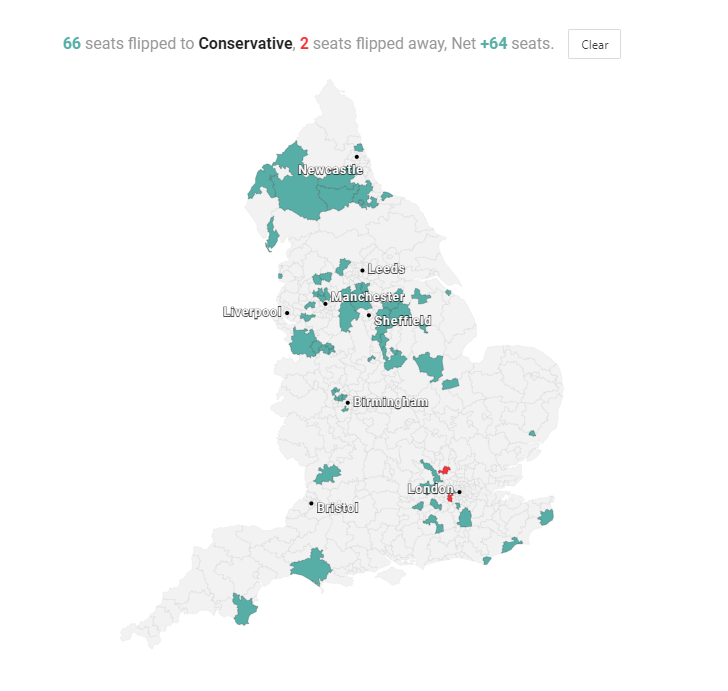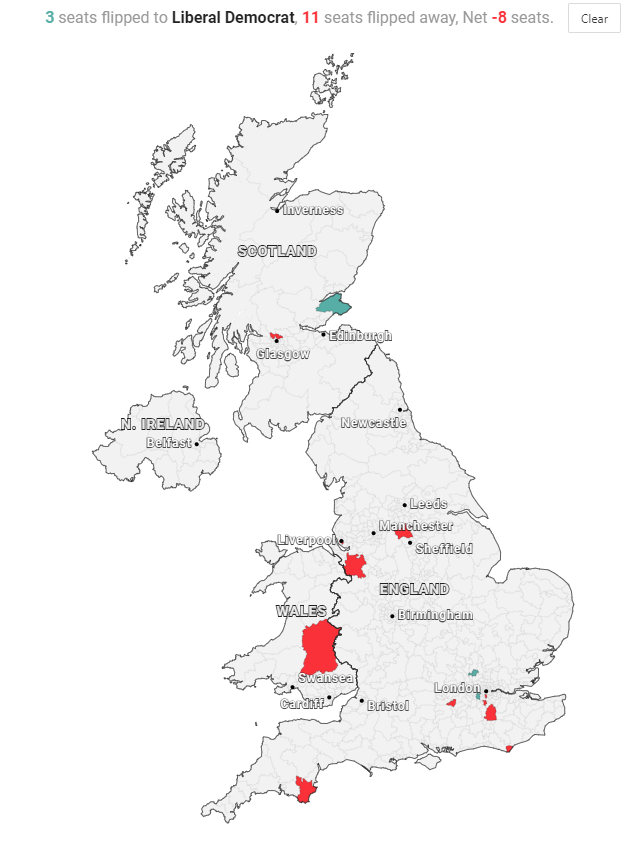The British Conservatives won the 2019 UK election, achieving the majority Boris Johnson needs to continue in office and break the deadlock that consumed British governance in 2019. And they did so in a way that has a ton more consequences than just this Parliament.
The Conservatives suffered 7 losses in Scotland, 2 to the Lib Dems, and 1 (Putney) to Labour. Given that, they needed 19 seats for majority government. Most of the conversation around this election was how the Tories wouldn’t be able to break through the Labour Red Wall – the band of seats in the North and Midlands that Labour held off against a Tory challenge last time. Because the Tory strategy was much the same between 2017 and 2019, plenty of people assumed the same result would come – the Tories would get close to breaking the wall, but fail. In reality, they broke down the wall.
The YouGov MRP, which accurately called a hung Parliament last time, missed this time, being too low on the Tories. LeanTossup, however, hit it almost perfectly, with a ~94% hit rate in individual constituencies (subject to final seats) and the closest topline of any model. Most importantly, none of the results that came through tonight were surprises. Caroline Flint losing in Don Valley wasn’t a surprise to us – her Tory opponent had an 83.3% chance of winning. Sedgefield, the West Bromwiches, the Wolverhamptons, all of these seats were expected by us. The way this election went was not only not some unpredictable sequence of events, it was predicted by us. In the first piece on this election published on this site, the idea that a hung parliament was particularly likely was scoffed at – with the warning it should be met with “extreme caution” being applied. That extreme caution was correct, and that article showed the way that Labour would lose their heartlands tonight. The Labour gain in Putney is a sign they are doing better with their Remain flank, but the dozens of Northern losses also show that the proposition in that piece was correct – the voters who swung this election were in the North.

Labour now faces a bloodletting – a long leadership struggle, with both the Leader and Deputy Leader positions up, and the soul and direction of the party up for grabs. They’ll need 123 seats to win majority government at a future election, and even if you count on SNP support (which is probably coming, if Scotland is still in the United Kingdom), it’s still a 75 seat climb required. The path is murky, unclear, with strong arguments about how to proceed in two ways, and questions if the notionally easier path is even available. Yes, Labour only lost plenty of their seats tonight by small margins in those Leave-voting heartlands, but once these areas aren’t Labour anymore, can they get them back? The Americans experience says no – once the Democrats lost states like West Virginia and Arkansas, there was no getting them back, except when Joe Manchin’s on the ballot. They may be the smaller margins, but many of them feel gone. Otherwise, Labour needs to reconstitute itself fully – becoming a party that can sweep the suburbs, that can win wealthy voters like it did in the New Labour days of 1997-2005. They would need to do historically well (for the Labour Party) for that strategy to work, but it may be the more sustainable path than tilting at ghosts of seats lost. The trouble is, they have to decide this, and the leadership, quickly, and there’s no easy answer.
The Liberal Democrats have similar questions to ask, as leader Jo Swinson fell in her Scottish seat and the party lost 10 seats overall. The purpose of the Lib Dems is unclear – playing spoiler in Kensington and allowing a Brexiteer in doesn’t exactly seem like a useful way to advance their particular brand of Remainer politics. Their entire purpose for being needs to be up for grabs in the coming months, as they attempt to figure out how to survive – or if survival is even a good outcome. The Lib Dems, and their predecessors back in the day, love saying that liberal values are needed now more than ever. Eventually they need to accept that that either isn’t true, or they are just horrendous salesmen for that idea.

The fact that Labour and the Lib Dems went into this election campaigning against each other everywhere was a mistake – and before the claim of revisionist history comes, here’s this argument being made in October. That piece outlines the dangers of running against each other, and those risks cost Labour and the Lib Dems seats up and down the country. Wimbledon, Cities of London and Westminster, Kensington, Chelsea and Fulham, Finchley and Golder’s Green all would have been safely in the Remain column, but because those two parties were too proud to make a deal, Boris has the biggest Tory majority since Thatcher’s third.
The future of Brexit will be the headline out of this election -‘and rightfully so. But the real story in the aftermath of this election is how the variegated parties of the left – Plaid Cymru and the SNP included – deal with the reality their supporters denied possible. The Tories have ju
st won a majority, a big one, and now the left has to put the pieces back together. Everything needs to be on the table – otherwise, the same fate that met blue dogs in the American south will meet the rest of Labour’s Northern members.
Evan Scrimshaw (@EScrimshaw) is Managing Editor and Head Of Content at LeanTossup.ca and a contributor to the Decision Desk HQ.